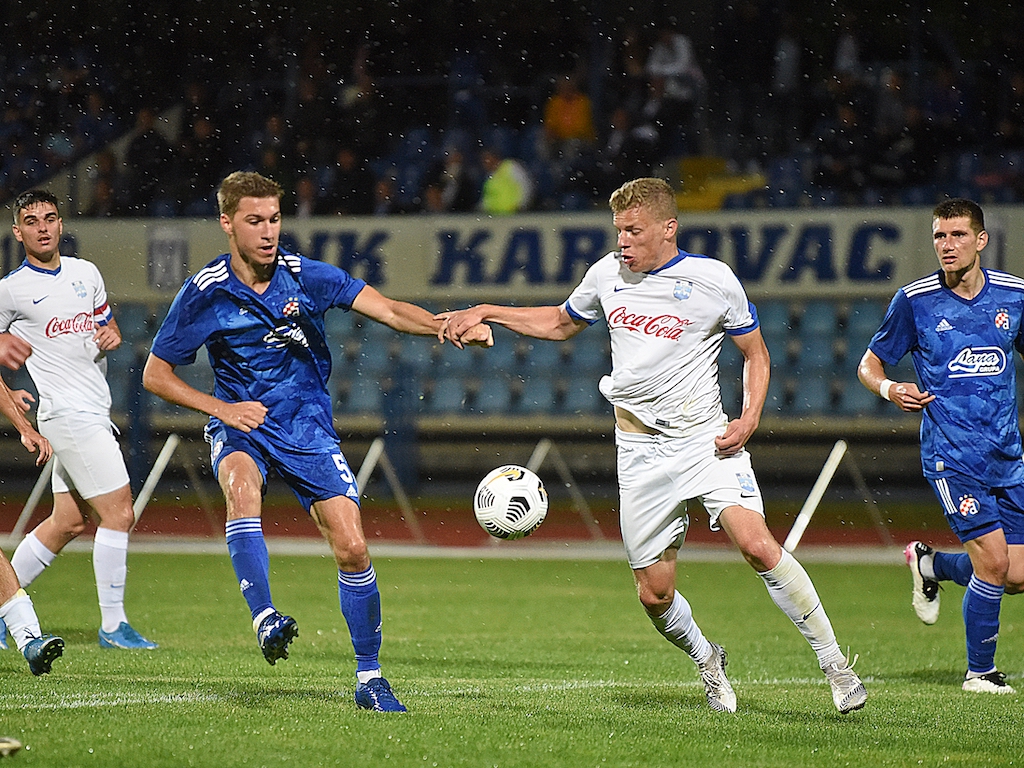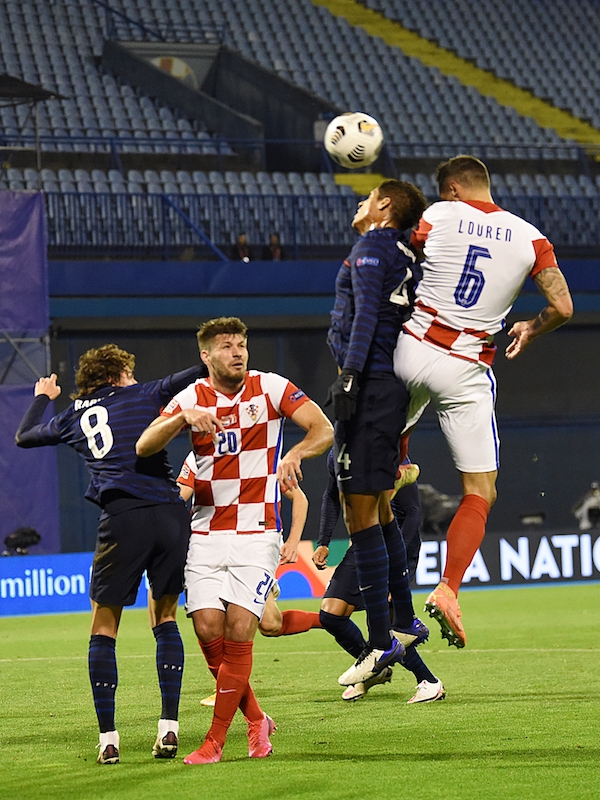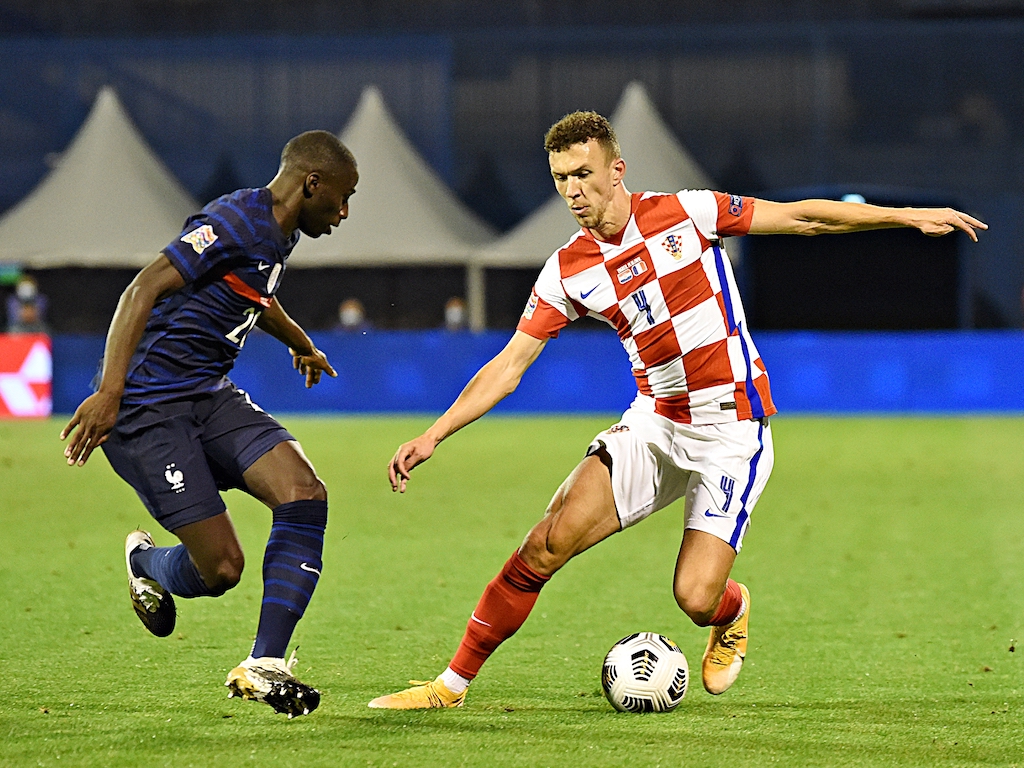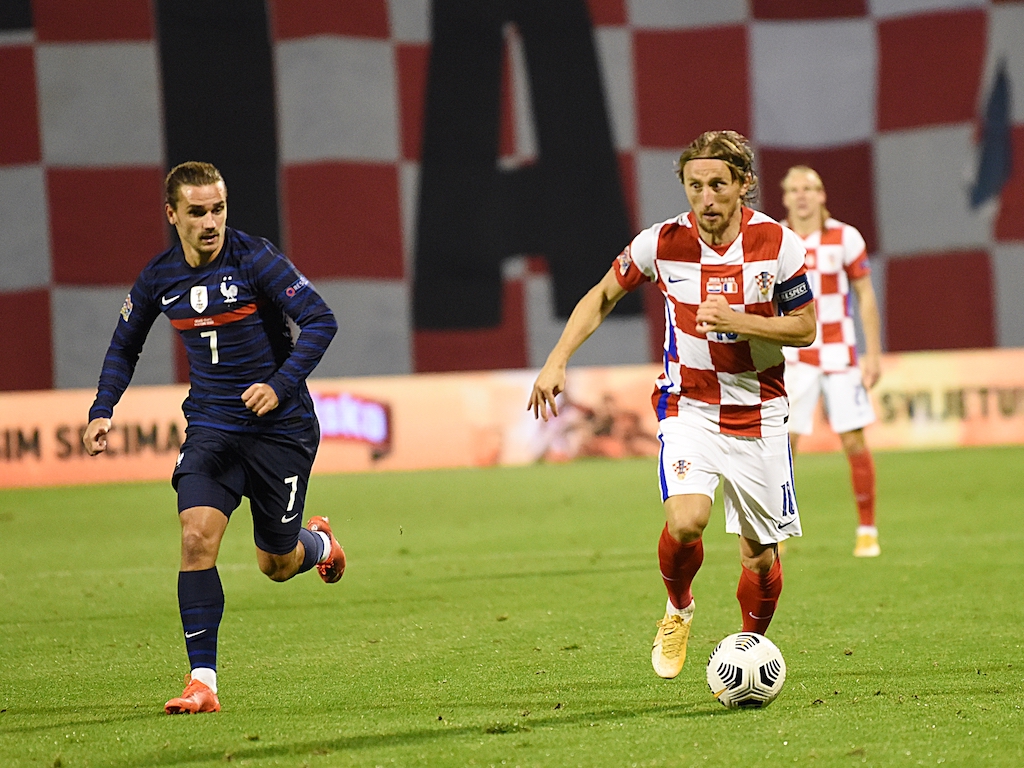Coach Zlatko Dalic Announces Updated Croatia Lineup
November 9, 2020 - The Croatia national team gathered on Monday ahead of its upcoming matches against Turkey, Sweden, and Portugal. Coach Zlatko Dalic announced an updated Croatia lineup and game plan.
The Croatia national football team is expected to play three matches in just six days. The 2018 World Cup finalists will play against Turkey in a friendly match on November 11, followed by their final Nations League campaign against Sweden on November 14 and in Split against Portugal on November 17.
Dejan Lovren was dropped from the squad at the last minute for the friendly match, and the Zenit stopper cannot play against Sweden due to cards. Lovren will thus join the national team in Split.
"I expect all invited players to come throughout the day and everyone to attend training. I know there were some problems, but we don't have any new announcements regarding absences. The only one who will be absent is Lovren, in agreement with me. He will stay in Russia and join the national team when we come to Split. He has a minor tendon injury and two yellow cards, so we don't have him against Sweden. We know that Kramaric will not attend due to injury, and the others on the list are all there," said Dalic.
The national team includes debutants Tomo Basic of Bordeaux and Marin Pongracic of Wolfsburg.
"Basic deserved an invitation based on his games for his club, and we want to try Pongracic, who has already received an invitation several times but could not come due to injuries. This time he is healthy, but I know he has been absent for a long time. I want him to be in the national team and feel the atmosphere," said Dalic.
Livakovic was also dropped from the lineup. Dalic thus has Kalinic, Grbic, and Sluga at his disposal, who will probably get a chance ahead of the others.
"Lovre Kalinic has been with us for a long time, but he hasn't been goalkeeping lately. There aren't many dilemmas because Sluga is the only one regularly in goal; he has rhythm and form. We will try to give a chance to two goalkeepers depending on the situation. I hope that Livakovic will be ready soon, he could join us already during these matches, but we will not rush with him. I trust the goalkeepers who are there," concluded Dalic.
Source: HNS
To read more about sport in Croatia, follow TCN's dedicated page.
Nations League: Croatia and Portugal without Spectators in Split
November 9, 2020 - The national teams of Croatia and Portugal will meet at Poljud Stadium in Split on November 17 for their final Nations League match this season.
Today, the National Civil Protection Headquarters of the Republic of Croatia extended the Decision on necessary epidemiological measures restricting assemblies and introducing other necessary measures and recommendations to prevent the transmission of COVID-19 through gatherings.
The decision of the headquarters includes the measure of holding sports competitions without the presence of spectators.
Following such a decision by the National Civil Protection Headquarters of the Republic of Croatia, the Croatian Football Federation informs the public that the Nations League match between Croatia and Portugal, scheduled for November 17 in Split, will be played without spectators. Also, the match between the youth national teams of Croatia and Lithuania in Pula will be played without fans.
The mentioned measure also refers to other competitions under the jurisdiction of HNS, which will be held without spectators until further notice.
Due to similar measures in Turkey and Sweden, the matches of the Croatia national team against Turkey (November 11) in Istanbul and Sweden (November 14) in Solna will be played without spectators.
Source: HNS
To read more about sport in Croatia, follow TCN's dedicated page.
Coach Zlatko Dalic Announces the Croatia Player List for Nations League in November
October 26, 2020 - National team coach Zlatko Dalic announces the Croatia player list for the upcoming Nations League matches in November, when the 2018 World Cup finalists will again have a tight schedule.
As in October, the national team will play three games during the upcoming gathering in November. Namely, Croatia will play a friendly match against Turkey on November 11 in Istanbul, followed by their two final matches in the Nations League - on November 14, they will play against Sweden (Solna / Stockholm), and three days later, they will host Portugal in Split.
Croatia currently sits in 3rd place in Nations League Group 3 with 3 points. Portugal and France are in first and second place with 10 points each. Croatia has only won one game in this Nations League campaign against Sweden earlier this month in Zagreb.
Coach Dalic invited 23 players and eight call-ups, among which is Bordeaux midfielder Toma Basic for the first time.
"We will monitor the condition of all players in the next two weeks and react on time, depending on the situation. I wish all invited players to be healthy so that we can welcome the last matches of this year and finish the competition in the Nations League in a satisfactory position," said Dalic.
The national team will gather on November 9 in Istanbul, and the day after the match against Turkey, they will travel to Stockholm. Croatia will travel to Split immediately after the match against Sweden.
Goalkeepers: Dominik Livaković, Simon Sluga, Ivo Grbić
Defenders: Domagoj Vida, Dejan Lovren, Borna Barišić, Duje Ćaleta-Car, Dario Melnjak, Filip Uremović, Domagoj Bradarić
Midfielders: Luka Modrić, Mateo Kovačić, Marcelo Brozović, Milan Badelj, Marko Rog, Mario Pašalić, Nikola Vlašić
Attackers: Ivan Perišić, Andrej Kramarić, Josip Brekalo, Bruno Petković, Mislav Oršić, Ante Budimir
Callups: Ante Rebić, Tin Jedvaj, Lovre Kalinić, Mile Škorić, Josip Juranović, Toma Bašić, Antonio Mirko Čolak, Marin Pongračić
Source: HNS
To read more about sport in Croatia, follow TCN's dedicated page.
UEFA Nations League: France Better than Croatia in Zagreb
October 14, 2020 - France was better than Croatia in Zagreb in the 4th round match of the UEFA Nations League.
The Croatia national team met France in the 4th round of the Nations League on Wednesday at Maksimir Stadium in Zagreb. Seven thousand fans (30% of the stadium) were there to cheer on Croatia.
Croatia beat Sweden 2:1 at the same stadium on Sunday and took third place in the group. With a victory against France, they would join the fight to win the group.
Coach Zlatko Dalic changed the starting formation a bit from Sunday's match against Sweden. While Livakovic stayed in goal, the backline included Borna Barisic, Domagoj Vida, Dejan Lovren, and Filip Uremovic. The midfield featured Luka Modric and Milan Badelj, with Nikola Vlasic as the attacking midfielder. Ivan Perisic and Mario Pasalic were on the wings, with Bruno Petkovic up top. Marcelo Brozovic had to sit this game out due to cards.
France coach Didier Deschamps, on the other hand, sent his strongest players in the attack, and decided to rotate the midfield - Lloris; Mendy, Varane, Lenglet, Digne; Tolisso, N'Zonzi, Rabiot; Mbappé, Griezmann, Martial.
The first five minutes of the match was even, and Croatia even had a chance to attack thanks to a quick run by Bruno Petkovic. However, it was France to find the back of the net first after Griezmann nailed the upper corner of the goal in the 8th minute for 0:1.
Slobodan Kadic
France danced around Croatia's defense and had what seemed like another sure chance in the 15th minute though Mbappe luckily hit wide.
Five minutes later, Lovren had a chance with a header off a Croatia corner kick which went over the goal.
A foul on Petkovic awarded Croatia a free-kick just outside the box in the 24th minute. Perisic hit just over the crossbar.
Vlasic took the France midfield in a quick counter-attack that found Barisic in the box, though Croatia was unable to capitalize. They certainly picked their momentum.
Slobodan Kadic
Croatia spent the better part of the next ten minutes in France's half. Perisic and Petkovic called for a handball in the box in the 35th minute after a brilliant play by Vlasic and Pasalic, but the ref let them play on.
Petkovic capitalized on a Mendy mistake in the 42nd minute and proceeded to get fouled again outside of the box, though there was no whistle to be heard.
A header from a France free-kick in the 44th minute made it close to being 0:2 but the match ended 0:1 at the half.
The second half began with some changes by Dalic. Kovacic and Brekalo were subbed on for Badelj and Pasalic.
Within the first two minutes, Perisic had a great attack on goal, though no one was in the box in time to receive his cross. Nikola Vlasic hit a rocket in the 52nd minute which just missed the goal.
Slobodan Kadic
Croatia was aggressive at the start of the second half and gave France little chance of moving their attacking game. Modric and Petkovic worked their way into the box often but the France defense held their backline.
Petkovic came out for Ante Budimir in the 60th minute.
After continued pressing from Croatia, it finally happened. Split wunderkind Nikola Vlasic did it again and scored the equalizer for 1:1 in the 64th minute!
The Croatia crowd found new energy to cheer and chant in the minutes that followed, which gave Croatia the strength to carry on.
France was awarded a corner that shouldn't have been which resulted in a crowd in front of Croatia's goal and quick reaction from the defense to clear the ball. Croatia was lucky France didn't retake the lead.
Bradaric came on for Perisic in the 78th minute.
Unfortunately, a long ball from Pogba found Mbappe who caught the Croatian defense off guard to score for 1:2 in the 79th minute. Dalic subbed Kramaric on for Vlasic one minute later.
Brekalo hit a rocket from just outside the box in the 85th minute which gave Lloris a tough time to save. Croatia was not giving up hope.
Modric found Kramaric for a chance in the 89th minute which Lloris saved again. More chances for Croatia in the final minutes of added time also proved unsuccessful. The match ended 1:2 for France.
Slobodan Kadic
Croatia's Nations League campaign continues next month against Sweden away and Portugal at Poljud Stadium in Split.
To read more about sport in Croatia, follow TCN's dedicated page.
HNS Announces Tickets for Croatia Matches against Sweden, France in Zagreb
October 4, 2020 - After UEFA decided that fans can return to stadiums at 30% capacity, HNS announces tickets for Croatia matches against Sweden and France in Zagreb.
HNS announced that following UEFA's decision to allow spectators to fill 30 percent of the stadium's capacity in UEFA competitions, the Executive Board of the Croatian Football Federation decided to use this opportunity and allow spectators to come to the Nations League matches against Sweden, France and Portugal. By UEFA's decision, the arrival of fans to away matches is not allowed.
Croatian fans will once again have the opportunity to watch and support the Croatia national team at home games, after a break of almost a year thanks to COVID-19. The UEFA Executive Board, with the participation of HNS President Davor Suker, decided to allow the national federations to return spectators to a maximum of 30 percent of the available capacity of the stadium.
Although there is little time left for Maksimir Stadium to organize the matches against Sweden (October 11) and France (October 14) and despite the numerous requirements that the organizer must comply with UEFA, the HNS Executive Board decided that the Federation will do everything for Croatian fans to watch Croatia play in a few weeks. After these games in October, Croatia will host Portugal in Split in November, also with spectators.
Spectators will be able to buy tickets for the West and North stands for the matches against Sweden and France, while the East and South stands will be closed to the public because of the Zagreb earthquake in March.
Ticket prices are as follows:
West middle lower: 250 kuna
West lower: 150 kuna
West upper: 100 kuna
North lower: 60 kuna
North upper: 60 kuna
Tickets can be purchased exclusively online, with ticket printing at home.
At the beginning of next week, HNS will inform the public about the manner and start time of ticket sales. Also, the Federation will inform the public about all organizational details of the match, i.e., strict measures that all spectators will have to follow to protect their health, the health of other spectators and in general - the concept of returning spectators to stadiums.
For the latest travel info, bookmark our main travel info article, which is updated daily.
Read the Croatian Travel Update in your language - now available in 24 languages
Join the Total Croatia Travel INFO Viber community.
UEFA Nations League: France Tops Croatia 4:2 at Stade de France
September 8, 2020 - Croatia and France met in Paris on Tuesday evening for the second round of the Nations League A group. In the 2018 World Cup rematch, France tops Croatia 4:2.
Croatia coach Zlatko Dalic changed half of the starting lineup from the match against Portugal. Melnjak was thus moved to left-back and debutant Uremovic to the right. Lovren played in the heart of the defense, accompanied by Duje Caleta-Car, while Perisic and Brozovic returned to the first 11. Modric and Rakitic were not included in this Nations League campaign.
France coach Deschamps also changed his starting eleven, and Lloris, Upamecano, Kante, and Griezmann remained from the first round against Sweden.
Recall, in the first round on Saturday, Croatia suffered a heavy defeat against Portugal, ending 4:1 for the current European champion and the first winner of the Nations League.
Croatia started the match much better than against Portugal and hungrier for the win. In the first five minutes, they attacked France's backline, while the defense was solid in denying Griezmann any chances. France had their first corner in the 11th minute, which was headed out by the Croatian defense.
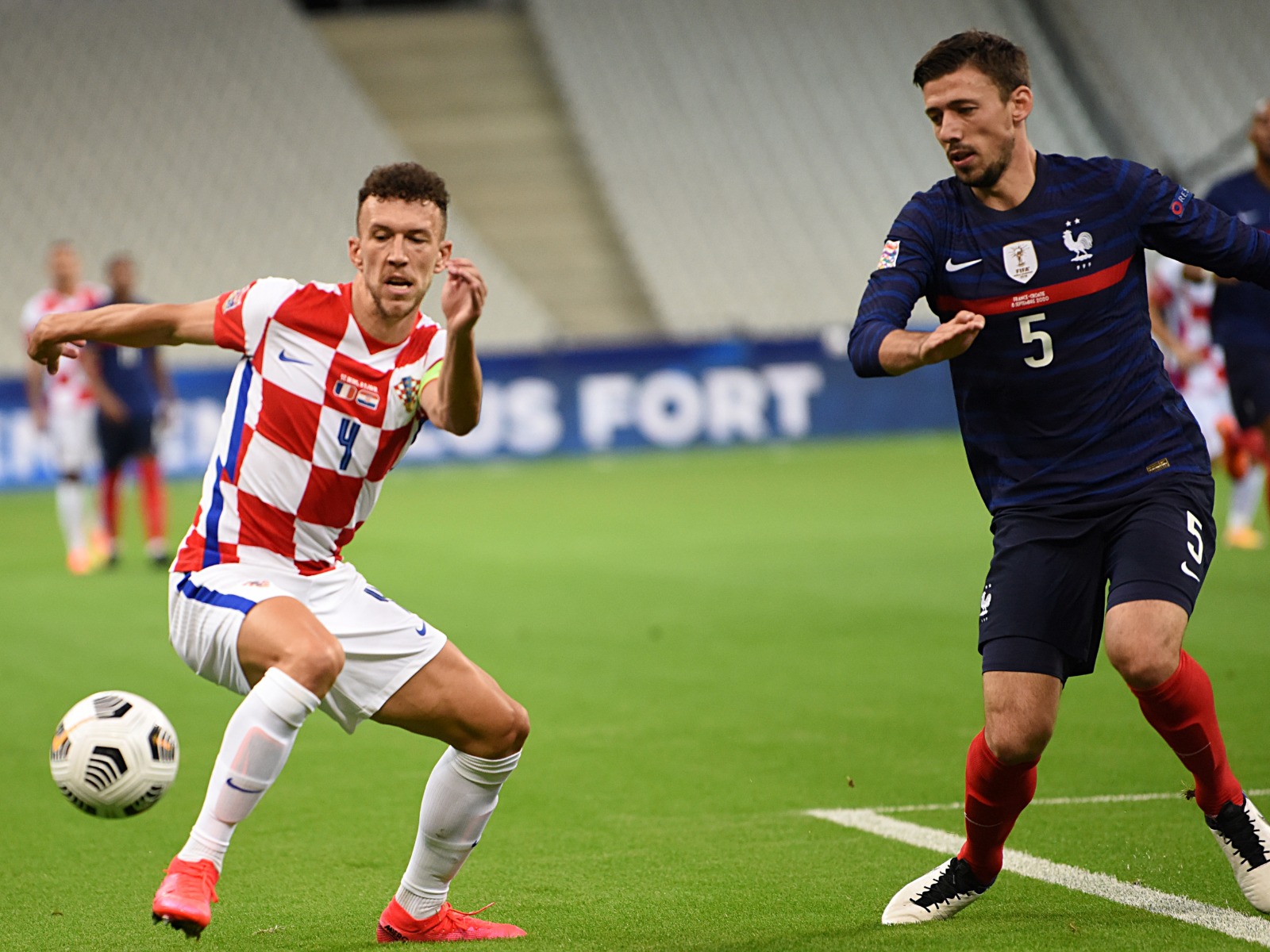
Slobodan Kadic
Croatia had their first real chance in the 13th minute, though Kovacic missed the shot after Kramaric attacked to get the ball into the box. A few minutes later, Brozovic playing a beautiful through ball to Rebic which ended in Croatia's first corner. Brozovic played a high ball in which found the foot of Lovren who brilliantly scored far post for 1:0 Croatia!
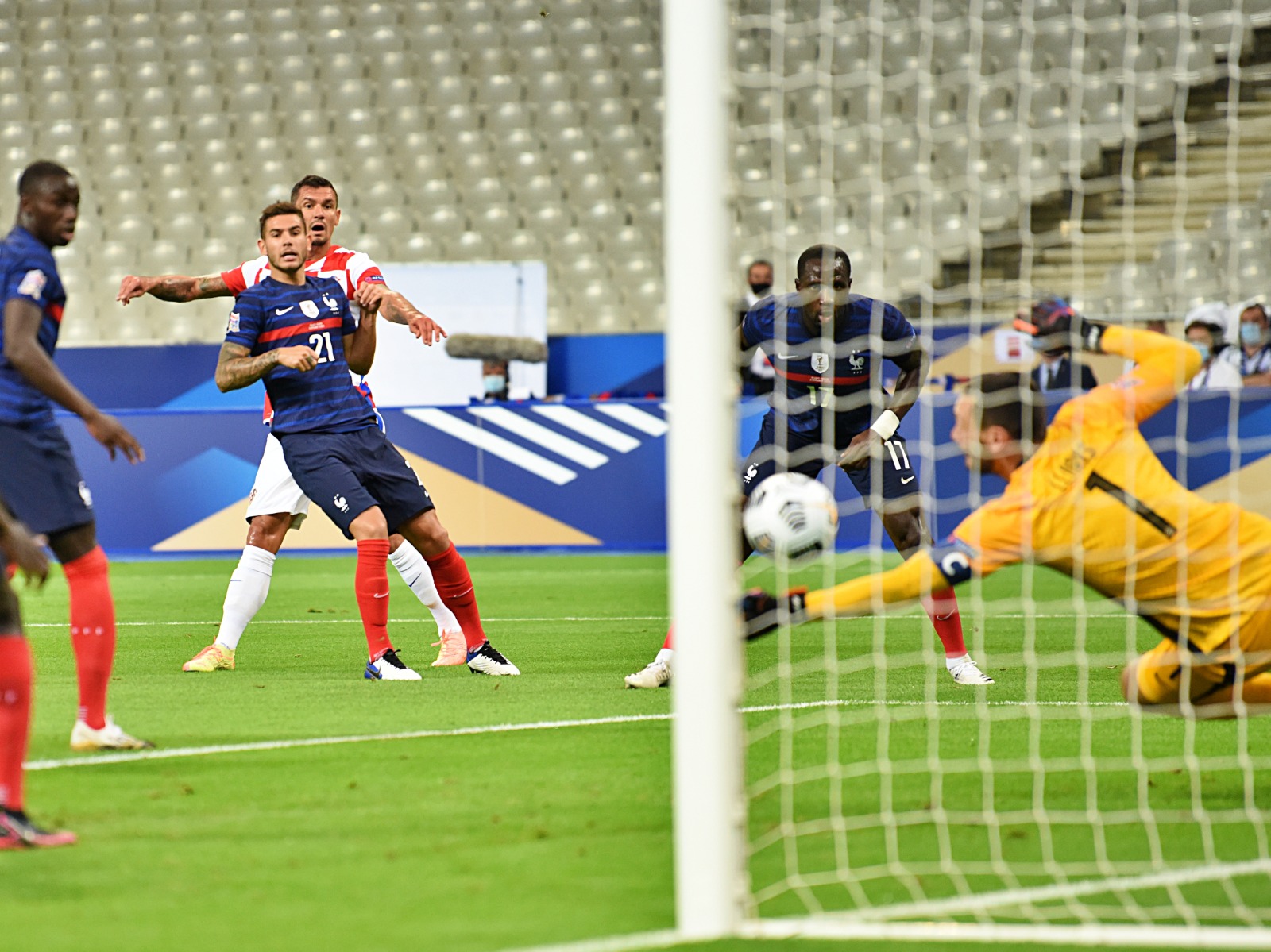
Slobodan Kadic
Croatia saw their second corner of the match in the 18th minute, which was played short and didn't make it into the box.
France picked up their game by the 20th minute, though their second corner was headed out by the Croatian defense. Griezmann was dangerous moments later but the backline remained solid in the block.
Perisic and Melnjak played a beautiful one-two up the left line which forced a free-kick for Croatia outside the box. An unlucky ball resulted in another Croatia corner.
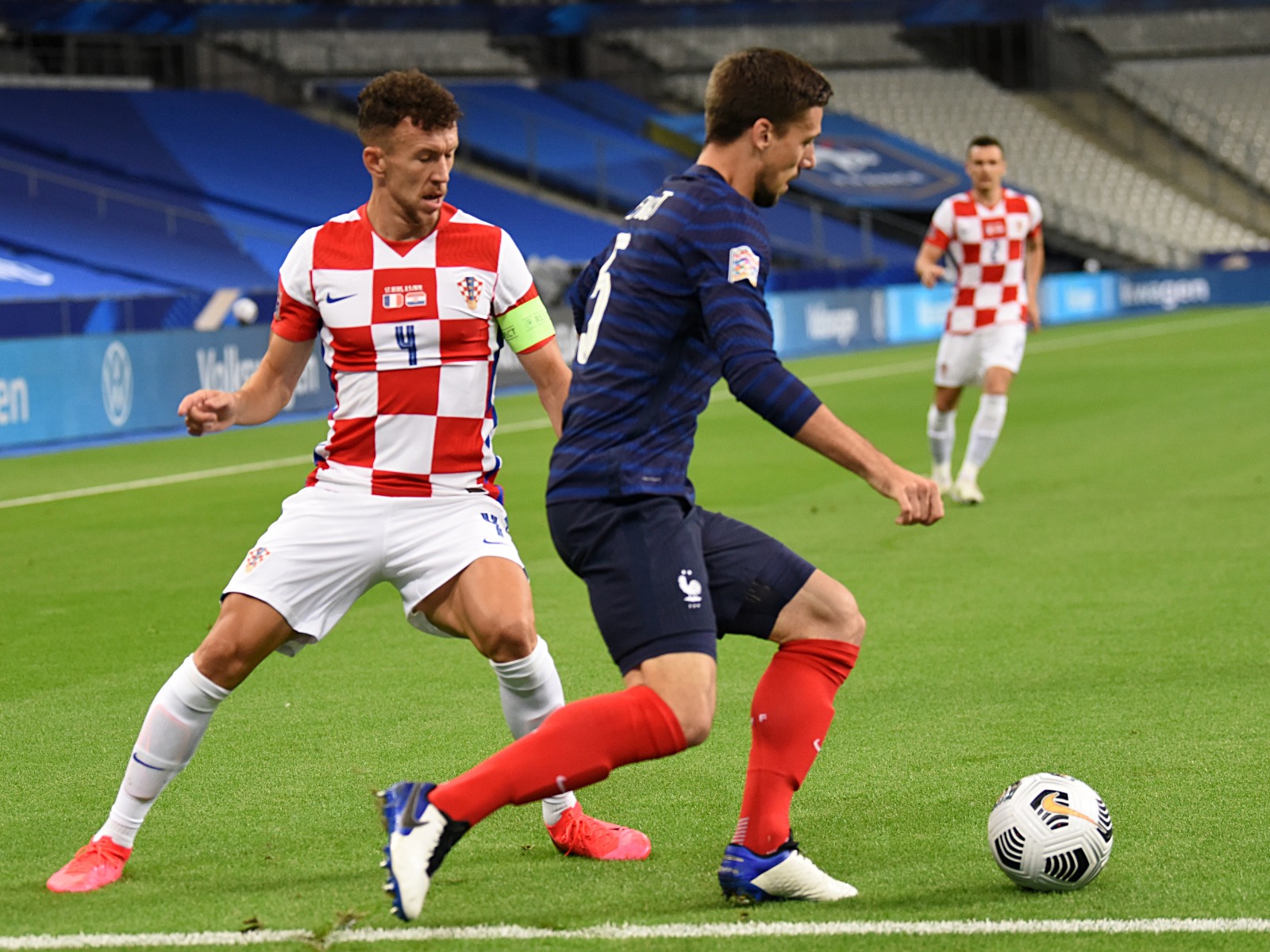
Slobodan Kadic
Croatia continued playing calm and collected, a much better performance than the team we saw just a few days ago.
They unraveled, however, for the first time in the 32nd minute - Griezmann had a chance to score but Brozovic and Livakovic were stellar to stop the dangerous play.
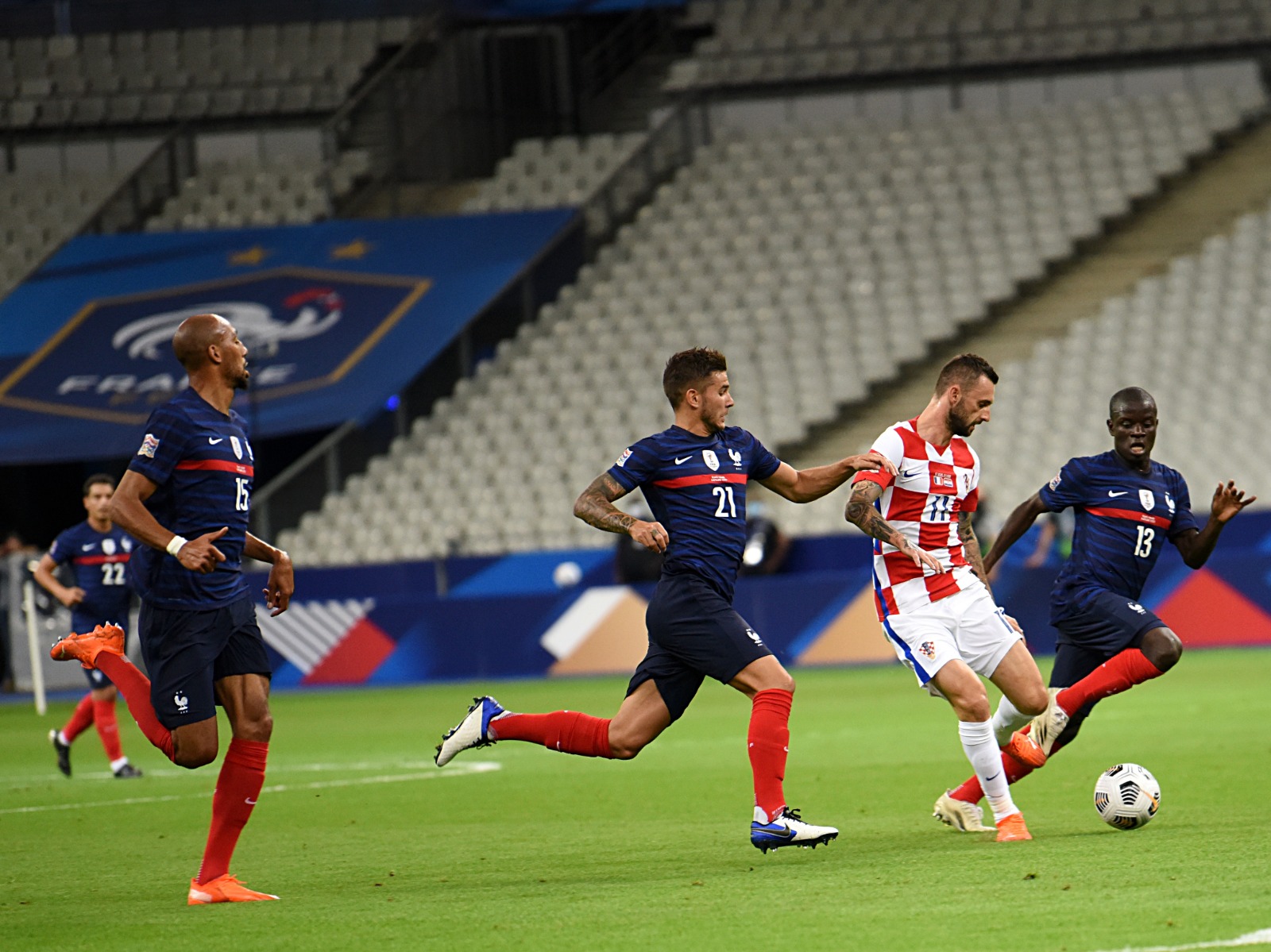
Slobodan Kadic
A France free-kick in the 34th minute, much like what we saw in the World Cup final, was worrying, but Griezmann shot over to keep the score 1:0 for Croatia.
Croatia was combining brilliantly for the remainder of the half, playing quick passes up the pitch to press the France defense. Perisic shot in the 42nd which was saved by Lloris.
Unfortunately, a quick France counter resulted in a goal in the 43rd minute. Griezmann scored for 1:1. Two minutes later, another quick counter saw France lead 2:1 with 30 seconds to go in the first half. Croatia held 57% of the possession in the first half.
At the start of the second half, Josip Brekalo was substituted in for Ante Rebic. France made no changes.
Croatia saw their first corner of the second half already in the 46th minute, though Vlasic called for a handball. Without VAR in the Nations League, there was no review.
Croatia continued pressing at the start of the second half and created good scoring opportunities, which were short of goals. France had their first corner of the second half in the 51st minute, which went over the post for a Croatia goal kick.
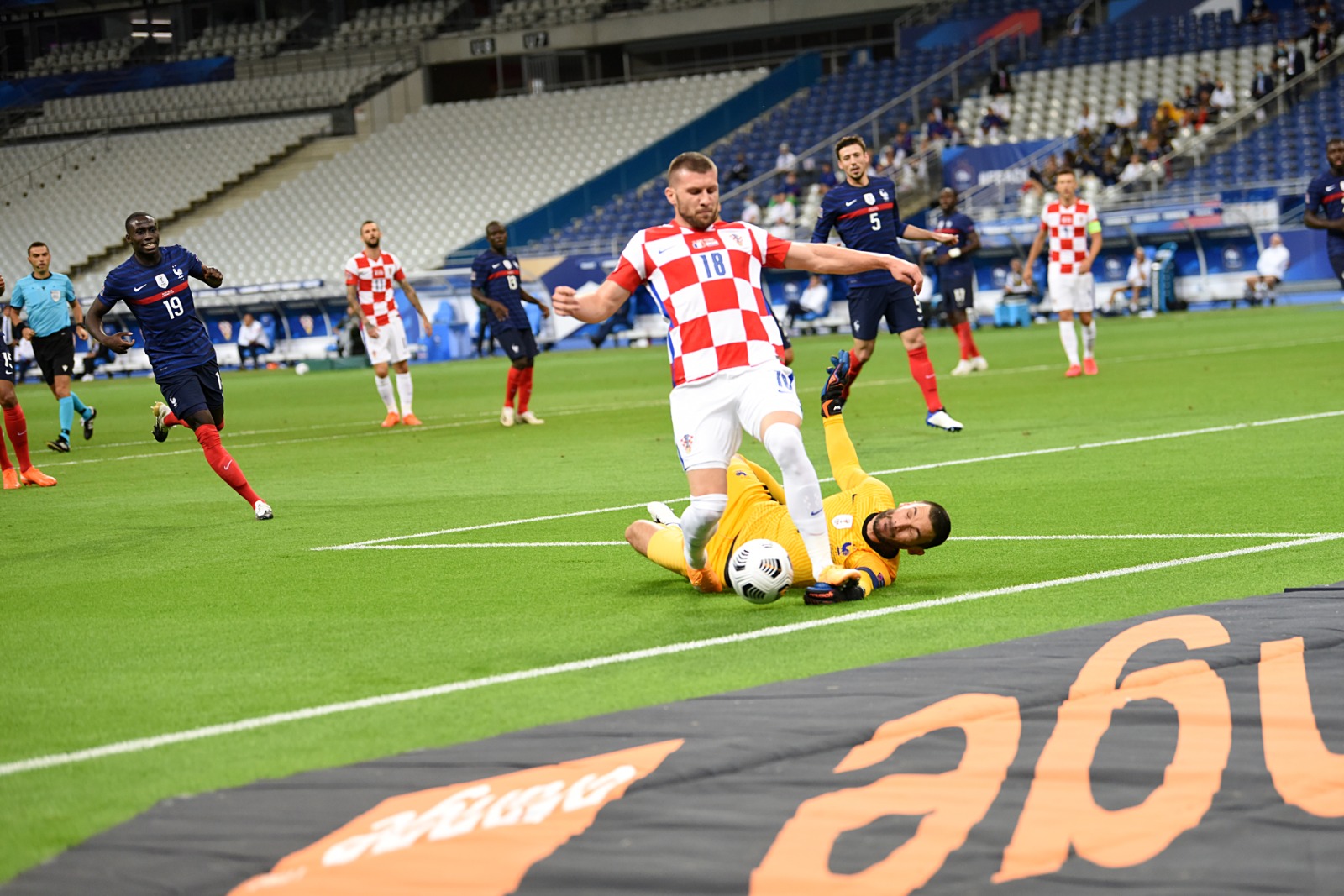
Slobodan Kadic
But then it happened, and Croatia could not have equalized any better. An incredible Kovacic ball from the halfway line found the foot of Brekalo who moved through three players in the French defense for 2:2!
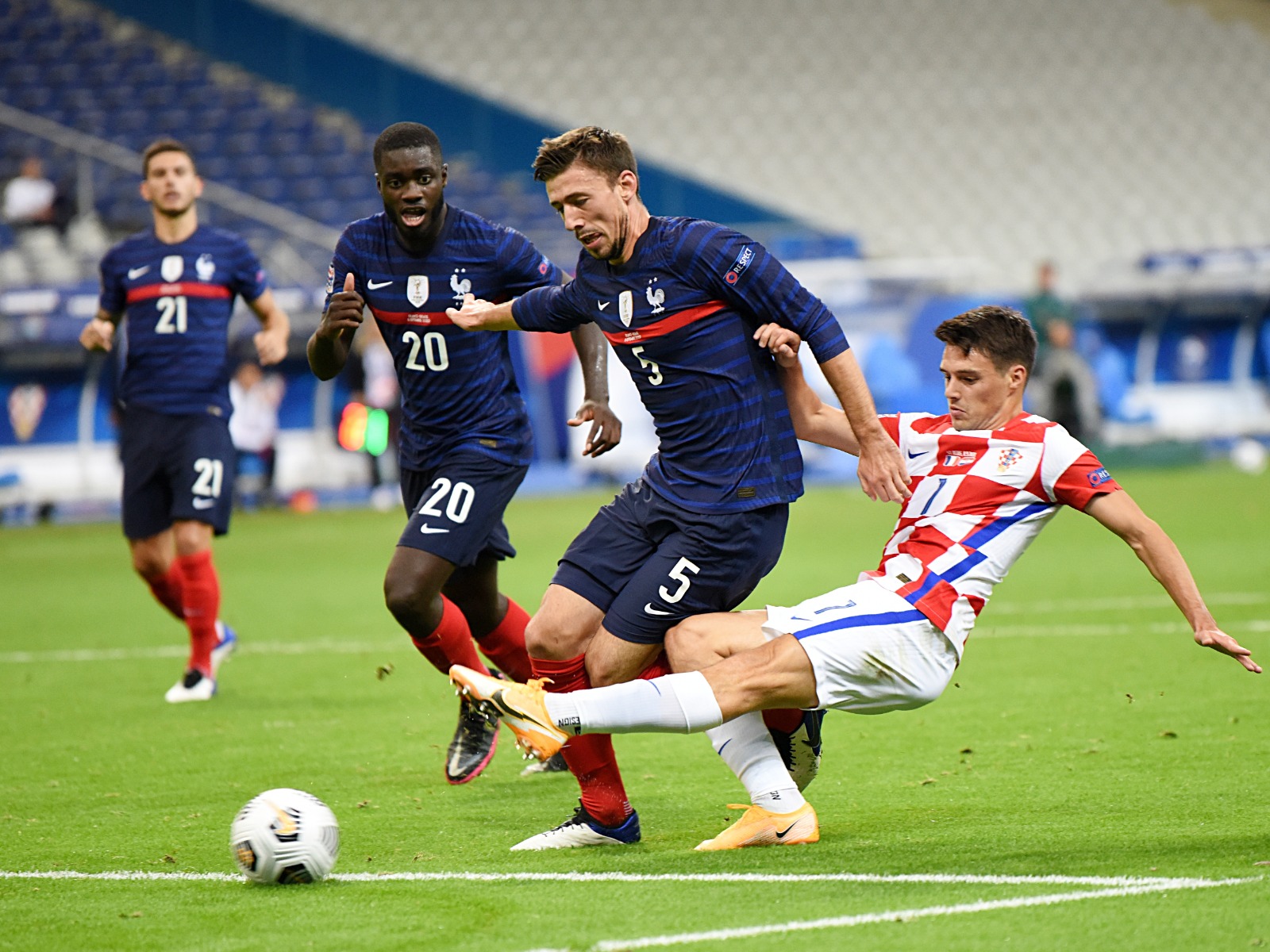
Slobodan Kadic
A free kick in the 61st minute deflected to Vlasic who crossed the ball back into Perisic, though he volleyed over the crossbar.
France had a corner in the 64th minute which finished in a goal to put them back in the lead at 3:2.
Livakovic and Brozovic once again saved a dangerous Greizmann counter. Croatia's tempo had died down in the second half, though they continued to push the ball up France's half when they could.
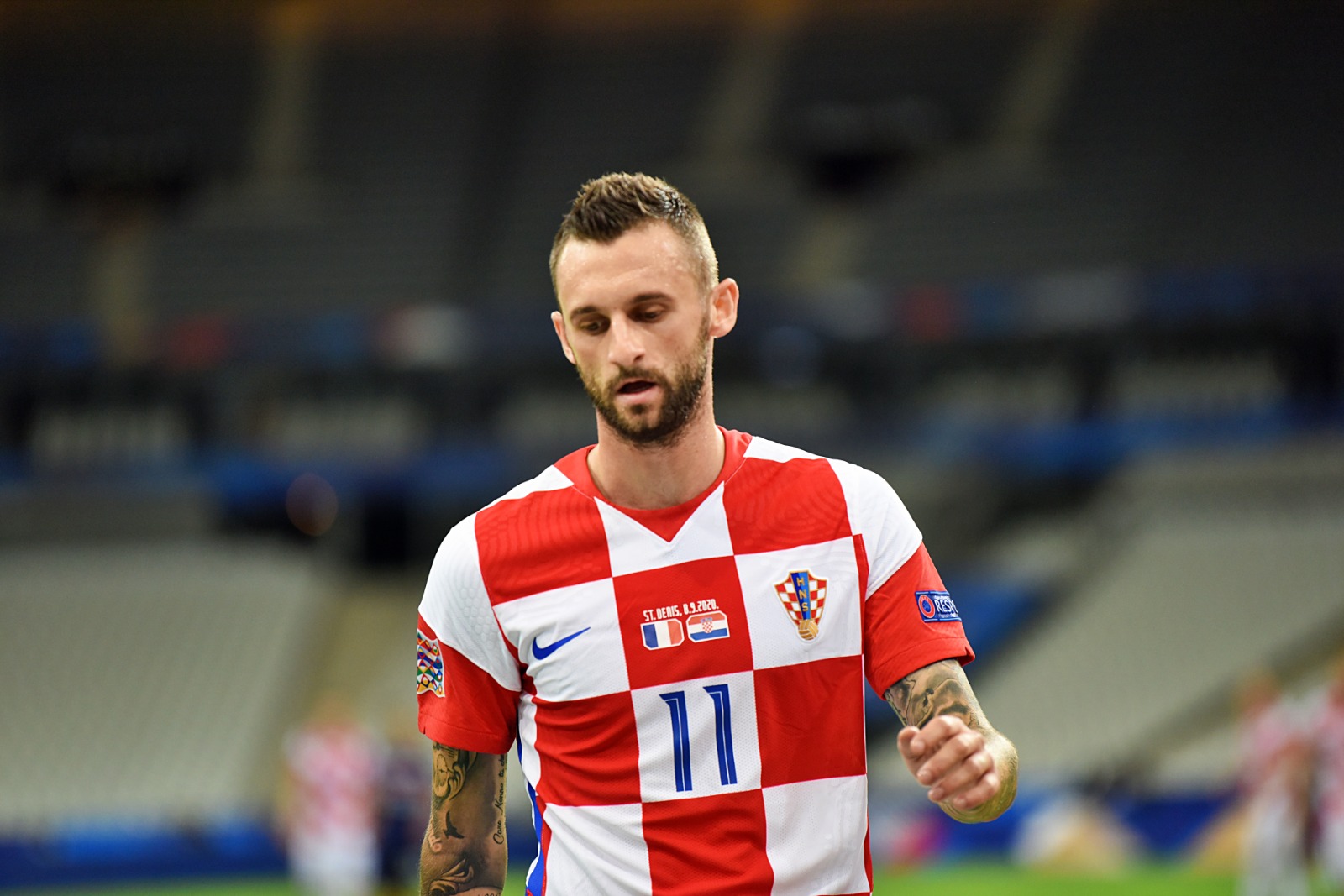
Slobodan Kadic
The game changed once France was awarded a penalty in the 75th minute due to a Croatia handball in the box. Giroud scored for 4:2, the same result as the 2018 World Cup final.
Croatia tried finding the momentum and rhythm they had in the first half, but France was solid in denying any chances.
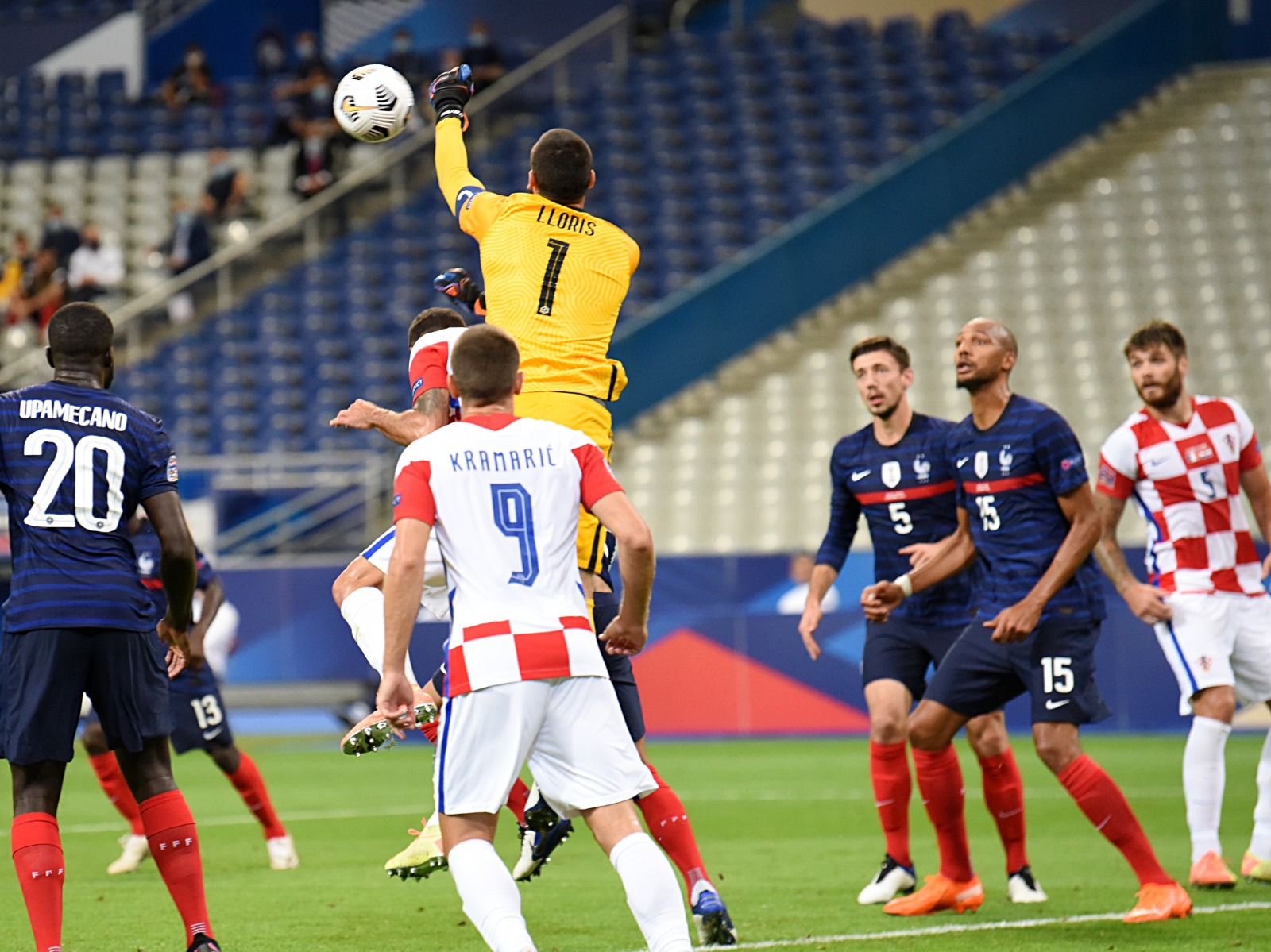
Slobodan Kadic
A Vlasic shot in the last two minutes of regulation time hit the side post, while Lloris saved another seconds later. The ref added four minutes, in which neither team was able to score.
The match ended 4:2 for France.
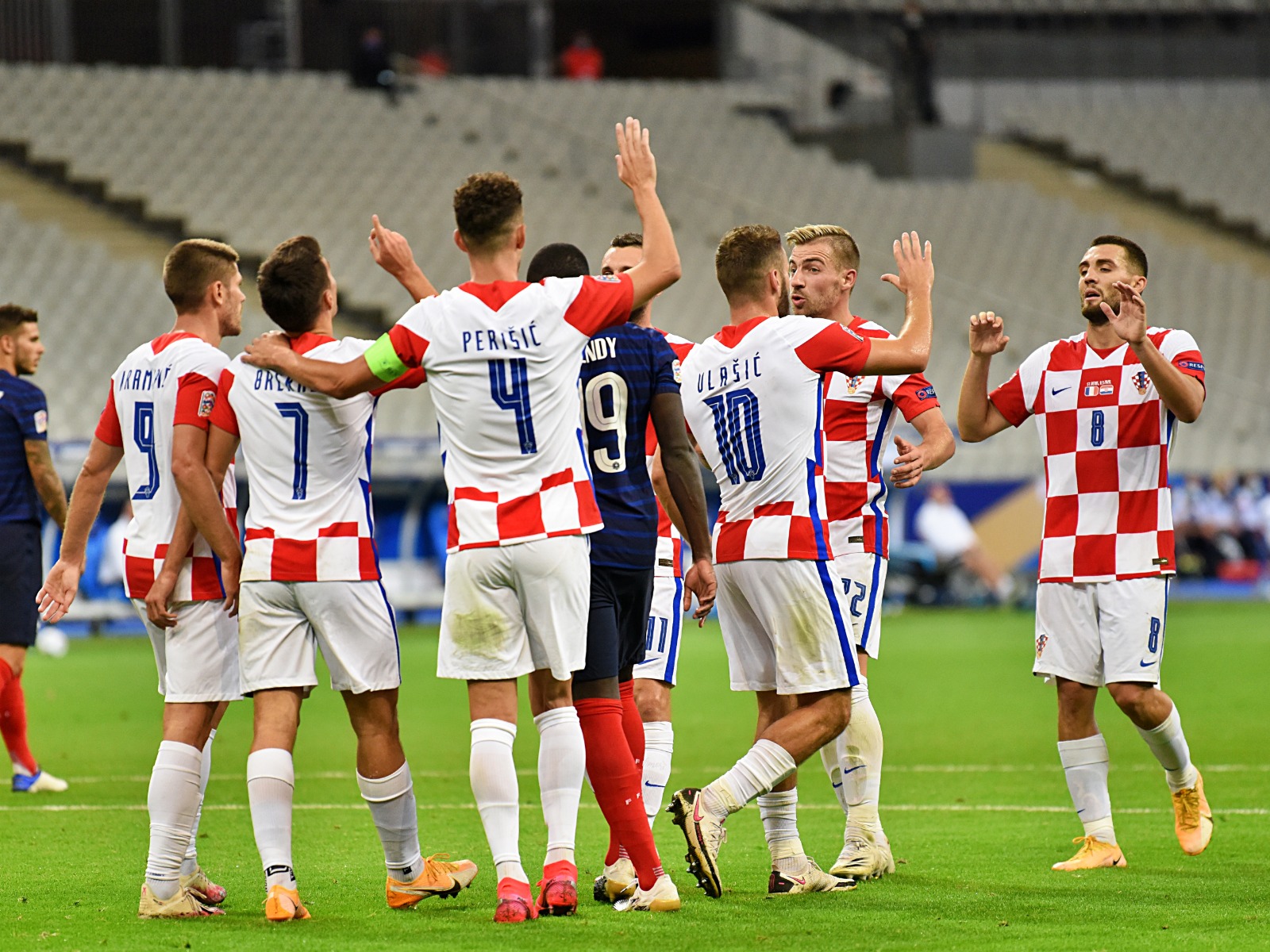
Slobodan Kadic
Conceding eight goals in two games is not the way Croatia wanted to start the Nations League. Up next, Croatia will meet Sweden and France at home in October.
For the latest travel info, bookmark our main travel info article, which is updated daily.
Read the Croatian Travel Update in your language - now available in 24 languages
Join the Total Croatia Travel INFO Viber community.
Croatia Team Manager Iva Olivari Named UEFA Delegate in Women's Champions League Final
August 29, 2020 - The team manager of the Croatia men's national team, Iva Olivari, was named the UEFA delegate in the women's Champions League final match.
After performing the same duty at the quarter-final match between Arsenal and PSG on August 22 and the semi-final match between Wolfsburg and Barcelona on August 25, Iva Olivari will be a delegate to the grand final, the clash of Wolfsburg and Lyon at the Anoeti Stadium in San Sebastian, HNS announced.
It is the highest official position in UEFA competitions, and the role includes controlling and supervising all aspects of the organization of the match.
"It is my great pleasure and exceptional honor to be a delegate in the final match of the Champions League. I thank UEFA and the Croatian Football Federation, led by President Davor Suker, who recognized my work and decided to nominate me for this position after many years in the Federation," said the Vatreni team manager.
“There will be two big rivals in the final, teams that are always at the top of women’s football, and I am eager to attend such an exciting match,” Olivari added.
In addition to Olivari, Croatia will have another representative in the grand final - the assistant referee of the final match of the Champions League will be Sanja Rodak-Karsic. The Croatian representative was in the same role in the Champions League final two years ago in Kyiv when the teams of Wolfsburg and Lyon also met, and the French side celebrated 4-1 after extra time.
Rodak-Karsic has already reffed at both the World and European Championships, including the final of the 2017 European Champs in the Netherlands.
Ivana Martincic was chosen as one of the ten main referees at the final tournament of the Champions League in Spain. However, she did not get a chance in the quarterfinals, semifinals, and final.
The lead official will be Switzerland's Esther Staubli, while Sanja Rodjak-Karsic and Ukrainian Oleksandra Ardasheva have been appointed assistants. The fourth official will be Czech Jan Adamkova.
For the latest travel info, bookmark our main travel info article, which is updated daily.
Read the Croatian Travel Update in your language - now available in 24 languages
UEFA Nations League Schedule Confirmed: Croatia National Team Returns in September
June 27, 2020 - The Croatia national team will return this September for their first game in 10 months.
UEFA announced the exact schedule for the Nations League competition on Friday. HRT reports that the Croatia national team, who will play in group A3, will open the competition with a visit to the defending champions Portugal on September 5 at 20:45. It will be the first game for the 'Vatreni' after a 10-month break.
Zlatko Dalic's team will be tested for the second time in this competition on September 8 against the 2018 World Champions, France, also played away. In the third round, Croatia will meet Sweden at home on October 11 (at 18:00), and three days later, they will play against France again, but at home (20:45).
In the fifth round, on November 14, Croatia will play against Sweden (20:45), and the competition will end on November 17 at home, where they will meet Portugal (20:45).
The winner of the first edition of the Nations League was Portugal. The winner of the UEFA competition wins 7.5 million euro, and each participant in League A will receive 1.5 million euro, while in the lower leagues (groups B, C and D) the prize pool is slightly lower. The total prize pool has increased from 76.25 million to 81.5 million euro because there are now 16 teams in the A league, not just 12.
You can find the full match schedule in the elite class of the Nations League below.
LEAGUE A
Group 1
Round 1 - September 4
Italy - Bosnia and Herzegovina
Netherlands - Poland
Round 2 - September 7
Bosnia and Herzegovina - Poland
Netherlands - Italy
Round 3 - October 11
Bosnia and Herzegovina - Netherlands
Poland - Italy
4 Round - October 14
Italy - Netherlands
Poland - Bosnia and Herzegovina
Round 5 - November 15
Italy - Poland
Netherlands - Bosnia and Herzegovina
Round 6 - November 18
Bosnia and Herzegovina - Italy
Poland - Netherlands
Group 2
Round 1 - September 5:
Iceland - England
Denmark - Belgium
Round 2 - September 8:
Belgium - Iceland
Denmark - England
Round 3 - October 11
England - Belgium
Iceland - Denmark
Round 4 - October 14
England - Denmark
Iceland - Belgium
Round 5 - November 15
Belgium - England
Denmark - Iceland
Round 6 - November 18
Belgium - Denmark
England - Iceland
Group 3
Round 1 - September 5
Portugal - CROATIA
Sweden - France
Round 2 - September 8
France - CROATIA
Sweden - Portugal
Round 3 - October 11
CROATIA - Sweden
France - Portugal
Round 4 - October 14
CROATIA - France
Portugal - Sweden
Round 5 - November 14
Portugal - France
Sweden - CROATIA
Round 6 - November 17
CROATIA - Portugal
France - Sweden
Group 4
Round 1 - September 3
Germany - Spain
Ukraine - Switzerland
Round 2 - September 6
Spain - Ukraine
Switzerland - Germany
Round 3 -
Spain - Switzerland
Ukraine - Germany
Round 4 -
Germany - Switzerland
Ukraine - Spain
Round 5 -
Germany - Ukraine
Switzerland - Spain
Round 6 -
Spain - Germany
Switzerland - Ukraine
NOTE: The group winners will play in the final tournament
To read more about sport in Croatia, follow TCN's dedicated page.
UEFA Euro 2020 Officially Postponed until 2021
March 17, 2020 - The European Football Federation (UEFA) has postponed the European Championship until the summer of 2021 due to the coronavirus pandemic.
The European Championships were scheduled to take place from June 12 to July 12 this year, however, the umbrella football organization postponed the tournament for next summer. The new term should be from June 11 to July 11, 2021.
This was a proposal made by representatives of the European Clubs Association (ECA), representatives of the national leagues and the World Trade Union of Footballers (FIFPro) at a video conference this morning at UEFA President Alexander Cheferin and Secretary-General Theodoridis. and representatives of national alliances.
The news of the postponement was first reported by many European media, and was also published by the Norwegian, Swedish and Scottish Football Associations, and was later officially confirmed.
You can read UEFA's statement in full below:
"UEFA today announced the postponement of its flagship national team competition, UEFA EURO 2020, due to be played in June and July this year. The health of all those involved in the game is the priority, as well as to avoid placing any unnecessary pressure on national public services involved in staging matches. The move will help all domestic competitions, currently on hold due to the COVID-19 emergency, to be completed.
All UEFA competitions and matches (including friendlies) for clubs and national teams for both men and women have been put on hold until further notice. The UEFA EURO 2020 play-off matches and international friendlies, scheduled for the end of March, will now be played in the international window at the start of June, subject to a review of the situation.
A working group has been set up with the participation of leagues and club representatives to examine calendar solutions that would allow for the completion of the current season and any other consequence of the decisions made today.
The decisions, taken by UEFA's Executive Committee, followed videoconference meetings held today with the presidents and general secretaries of the 55 national associations, as well as representatives of the European Club Association, European Leagues and FIFPro Europe, convened by UEFA President Aleksander Čeferin, to find a coherent plan to break the logjam of fixtures building up due to the spread of the virus across the continent."
Announcing the decisions, Aleksander Čeferin said:
"We are at the helm of a sport that vast numbers of people live and breathe that has been laid low by this invisible and fast-moving opponent. It is at times like these that the football community needs to show responsibility, unity, solidarity and altruism.
"The health of fans, staff and players has to be our number one priority and, in that spirit, UEFA tabled a range of options so that competitions can finish this season safely and I am proud of the response of my colleagues across European football. There was a real spirit of cooperation, with everyone recognising that they had to sacrifice something in order to achieve the best result.
"It was important that, as the governing body of European football, UEFA led the process and made the biggest sacrifice. Moving EURO 2020 comes at a huge cost for UEFA but we will do our best to ensure that the vital funding for grassroots, women's football and the development of the game in our 55 countries is not affected. Purpose over profit has been our guiding principle in taking this decision for the good of European football as a whole.
"Football is an uplifting and powerful force in society. The thought of celebrating a pan-European festival of football in empty stadia, with deserted fan zones while the continent sits at home in isolation, is a joyless one and one we could not accept to celebrate the 60th anniversary of the competition.
"I would like to thank the European Club Association, the European Leagues and FIFPro Europe for their great work today and for their cooperation. I would also like to thank from the bottom of my heart the 55 national associations, their presidents and general secretaries, and my colleagues from the Executive Committee for their support and wise decisions. The fine detail will be worked out in the coming weeks but the basic principles have been agreed and that is a major step forward. We have all shown that we are responsible leaders. We have demonstrated solidarity and unity. Purpose over profit. We've achieved this today.
"I would also like to thank Alejandro Domínguez and CONMEBOL, who have agreed to move CONMEBOL's 2020 Copa America in order to follow the recommendations issued by the international public health organisations to enact extreme measures and as a result of EURO 2020 being postponed. This means that clubs and leagues in Europe will have as little disruption as possible in the availability of their players. These joint efforts and especially this coordinated and responsible decision, are deeply appreciated by the whole European football community.
"I would like to thank FIFA and its President, Gianni Infantino, who has indicated it will do whatever is required to make this new calendar work. In the face of this crisis, football has shown its best side with openness, solidarity and tolerance."
UEFA EURO 2020 was scheduled to take place in 12 cities across Europe from 12 June to 12 July 2020. The proposed new dates are 11 June to 11 July 2021. UEFA would like to reassure existing ticket buyers and hospitality clients that if they cannot attend the tournament in 2021, the face value of their tickets and packages will be refunded in full. Within the next month, further information on the refund process will be communicated to existing ticket buyers via email and on euro2020.com/tickets.
Decisions on dates for other UEFA competitions, whether club or national team for men or women, will be taken and announced in due course.
Stay tuned for a piece on what this means for the Croatia national team.
To read more about sport in Croatia, follow TCN's dedicated page.
UEFA Nations League: Croatia in Elite League A With...
March 3, 2020 - The UEFA Nations League draw was held in Amsterdam on Tuesday. Croatia will play in Group 4 against Sweden, France and Portugal.
Following the football excitement that awaits us at Euro 2020 this summer, we can also look forward to the new edition of the Nations League awaits in early September. The matches will be played in September, October and November this year.
Croatia will play in the elite League A against Sweden, France, and Portugal.
The first-ranked team from the group will play in the Nations League final tournament, and the last-placed team falls out of the strongest class.
The Nations League starts at the beginning of September this year (September 3-5) and the remaining dates September 6-8, October 8-10, 11-13, and November 12-14, 15-17 this year.
Croatia will play against the current world and European champions. It is interesting to note that the national team will play friendly matches against both teams ahead of the Euros. The 'Vatreni' has never defeated France or Portugal in history.
Sweden is 17th in the FIFA rankings and no easy game, but it is clear that France and Portugal will be the biggest rivals in the fight for first place leading to the Final Four.
Recall, Portugal won the first edition of the Nations League in 2019.
"We got probably the strongest group that could have been. But it's very nice, we will play against the European and world champions," Zlatko Dalic said, adding:
"We knew we were expecting tough opponents, as the whole group was like that. This will be good preparation for what awaits us later, which is Qatar qualifications. I think the competition is tough, that's what suits us and that's what we want."
League A
Group 1: Poland, BiH, Italy, Netherlands
Group 2: Iceland, Denmark, Belgium, England
Group 3: CROATIA, Sweden, France, Portugal
Group 4: Germany, Spain, Ukraine, Switzerland
League B
Group 1: Romania, Northern Ireland, Norway, Austria
Group 2: Israel, Slovakia, Scotland, Czech Republic
Group 3: Hungary, Turkey, Serbia, Russia
Group 4: Bulgaria, Ireland, Finland, Wales
League C
Group 1: Azerbaijan, Luxembourg, Cyprus, Montenegro
Group 2: Armenia, Estonia, Northern Macedonia, Georgia
Group 3: Moldova, Slovenia, Kosovo, Greece
Group 4: Kazakhstan, Lithuania, Belarus, Albania
League D
Group 1: Malta, Andorra, Latvia, Faroe Islands
Group 2: San Marino, Liechtenstein, Gibraltar
More soon...
To read more about sport in Croatia, follow TCN's dedicated page.


